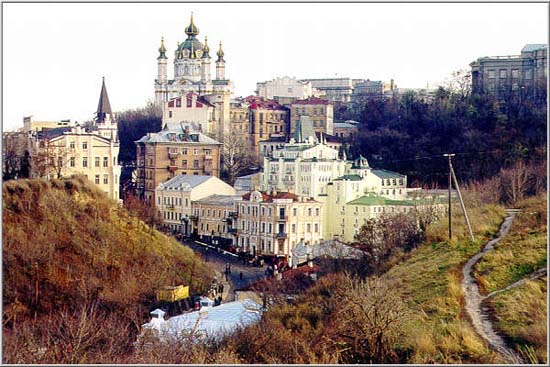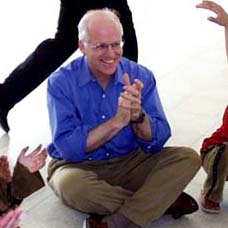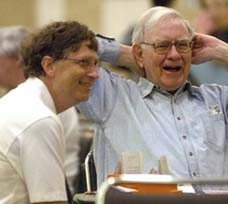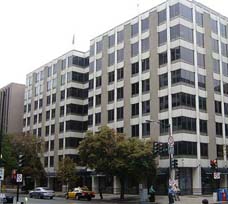
"Back then there was a much stronger idealistic element than now, people joined to get a taste of the overseas and do some good. These days motivation is more career-driven. People join to change their career direction or as a way to leave the States," Anderson said. While it is true that many do join as a way of making a career or life change, it seems that some element of the original idealism still makes its way into the overall experience. Valerie Wright, a former Peace Corps volunteer and member of the original Ukrainian group said that by the end of their term, her group's philosophy had become to "change one person at a time". This contrasts with their initial concentrating off fulfilling programmatic goals.
After delving into the Peace Corps operation in Ukraine, it has become apparent that in terms of goals, the Peace Corps is working hard to bring its programmatic goals in line with the vision of the Ukrainian government, and to improve its services and support to its volunteers on an ongoing basis
Peace Corps Numbers Up But Quality Questions Remain
By Lua Pottier
After 14 years of cooperation with the Ukrainian government, the term 'Peace Corps volunteer' is almost a household name around Ukraine. In fact, according to former Peace Corps director, Jerry Dutkewych, the term was well known after a mere 5 years. In a 1998 press interview, Dutkewych said, "I think one of our biggest successes is that Ukrainians know that Peace Corps volunteers are in Ukraine".
Though the term is well known, why volunteers are here is not. According to official Peace Corps statistics, Ukraine has the highest number of volunteers in the Peace Corps world. Additionally, compared to other countries where Peace Corps operates, Ukraine has both a higher level of overall industrialization and a relatively stable political environment. So then, what exactly is the focus of the volunteers' work here? What are they hoping to achieve and why is Ukraine still so high on the Peace Corps' priority list?
Peace Corps began as a response to John F. Kennedy's challenge in 1961 that young Americans serve their country in the cause of peace by living and working in developing countries. Remarkably, David Anderson, a Peace Corps volunteer from that era that also served as a consultant during the process of setting up Peace Corps in Ukraine, is still residing here. According to him, the main difference between the beginning years and now is one of motivation.
"Back then there was a much stronger idealistic element than now, people joined to get a taste of the overseas and do some good. These days motivation is more career-driven. People join to change their career direction or as a way to leave the States," Anderson said. While it is true that many do join as a way of making a career or life change, it seems that some element of the original idealism still makes its way into the overall experience. Valerie Wright, a former Peace Corps volunteer and member of the original Ukrainian group said that by the end of their term, her group's philosophy had become to "change one person at a time". This contrasts with their initial concentrating off fulfilling programmatic goals.
Nevertheless, the local Peace Corps office periodically monitors and evaluates programmatic goals, adjusting them according to the changing needs expressed by the Ukrainian government. This is a reflection of the high level of cooperation that Peace Corps enjoys with the Ukrainian government. When Peace Corps offered their services to Ukraine just following the fall of the Soviet Union, the agreement was made on the presidential level. Agreements with host countries generally are made on a ministerial level, so having both former Ukrainian president Leonid Kravchuk and former American president George Bush (senior) personally sign the final Peace Corps agreement immediately set Ukraine apart and indicated the high level of governmental support for the program.
Providing the assistance that Ukraine requested involved creating a brand new Peace Corps program in economic development. Thus the first group of Peace Corps volunteers to arrive in Ukraine was also the first volunteers to pilot the new program area. Wright describes that first group as being very competitive. "In our group we had a couple of MBAs (Masters degrees in Business Administration), representatives of Fortune 500 companies, successful business managers, and hot interns from major corporations."
Due to the newness of this economic development program, a lot of improvisation was required on the part of the volunteers. Wright describes that time as being imbued with a sense of historical opportunity that inspired mixed reactions from Ukrainian counterparts. She explained the mixed reactions, saying, "For a number of Ukrainians, especially those in local governing bodies, having Americans around was a constant reminder of the failure of their system." In practical terms, this often meant that cooperation with officials was more theoretical than actual.
Change is always difficult and even more so when emerging from a totalitarian regime. According to Anderson, regime change of this sort brings with it an ingrained sense of paranoia. Post-soviet bureaucrats were quite wary of the Peace Corps volunteers and before the economic collapse in 1993 did their best to "keep an eye" on their activities. Typically, economic programs suggested by the volunteers - beyond the simplest ones - were extremely difficult to implement. The most frequently asked question for Peace Corps volunteers was (and still is), "Why are you here? Why did you volunteer?"
peace_copr_volunteer2.jpgAnderson goes on to remark that, at the time, Ukrainians found the concept of volunteering out of free will, in a non-coerced and non-cynical context, hard to accept and understand. As the years went by, this attitude began to change. These days, due to the advent of local volunteerism in non-governmental organizations and among Ukrainian society at-large, whatever answer volunteers give to this question of "Why?" is generally accepted without much surprise.
A Peace Corps English language teaching program and a smaller environmental program followed the initial economic development program. As the years went by, the programs evolved from being less structured with fewer programmatic goals beyond those of cultural exchange, to more systematic with goal-setting more in-line with Ukrainian government expectations and desires. Simultaneously, volunteers' activities have been moving towards greater personal responsibility for projects and initiatives, and overall the roles of volunteers have become increasingly complex.
In an interview conducted for the Ukrainian Weekly in 2003, then-director Karl Beck revealed, "In addition to their primary job responsibilities as English and management teachers, business advisors and environmental activists, volunteers work as change agents in Ukrainian towns and villages, carrying out community projects..." Currently, approximately two-thirds of the Peace Corps projects in Ukraine are English language related, and there is a new youth development program. Other programmatic changes include geographical distribution. Previously, volunteers were primarily placed in large cities and towns all over Ukraine; these days they are placed in villages and smaller communities.
Beck notes in the interview that there are already a significant number of tangible programmatic successes, including "the work of a grandmother from Atlanta who wrote state-of-the-art textbooks for five years of university-level English teacher training, the creation by a retired architect from Princeton, N.J., of green parks throughout a western Ukrainian town, the training by a young Cornell University business graduate of dozens of dairy farmers in the Lviv Oblast on managing the business aspects of farming, the refurbishment of a Kirovohrad orphanage by a young man from Connecticut, the launching of a nationwide campaign against the spread of HIV/AIDS by a young woman from New York City, and the establishment of women's business centers in Crimean Tatar villages by a woman from Dallas who before retirement had been one of Kodak's top managers..."
According to Helen Petrozzola, current deputy director of Peace Corps Ukraine and a former Peace Corps volunteer, individual successes led to new programming. Petrozzola remarks, "Ukrainian society is so dynamic, the relevance of Peace Corps to Ukraine lies in our program's ability to remain flexible and responsive to Ukraine's development needs." As a result of this perspective, three program advisory committees have been formed to guide the process of program development. The committees include local NGO representatives, relevant government officials, Peace Corps volunteers and staff. The Committees' main goal is to review programmatic processes and develop goals, examine feedback from the field, make programmatic decisions and develop ways to improve the effectiveness of the programs.
Headway has also been made in the area of choosing locations for Peace Corps volunteers. Previously the selection process was not entirely systematic. Now, however, there are a number of lead specialists whose main job is to travel around Ukraine and identify smaller communities that would like to request a Peace Corps volunteer.
After expressing interest, there is a thorough process of assessing and revisiting the community to check and double check the suitability and feasibility of hosting a volunteer there. Petrozzola notes that despite an abundance of enthusiasm, there is often little understanding of what hosting a volunteer fully entails. She also points out that, "When there is sufficient good will on both sides, Ukrainians and Americans almost always find a way to cooperate and learn from each other. But usually the first six months are the most challenging because the volunteer is working on integrating into the community and being productive there, while simultaneously the local community is learning how to live and work with an American, usually in sites where previously few or none have ever been."
While supportive of the new system of site selection, all former volunteers expressed concerns about the initial volunteer recruitment/selection process. The field office is not involved in the actual selection process; they merely categorize their volunteer needs and submit the numbers requested to the main headquarters in Washington D.C. As can be expected, any interaction involving humans is bound to be tricky, especially when attempting to match the best set of characteristics and qualifications with specific needs.
The general feeling among the former volunteers seems to be that in order to fill the field office goals, the recruiting offices in the States may allow people into the program who are not best-suited for service because of a variety of reasons. Petrozzola points out, "There is a specific volunteer attitude involved in any volunteer work. Volunteers have to be flexible and do their best to respond to local needs-even if this involves the volunteers writing a business plan in the mayor's administration one day and then helping their host family with potato harvesting the next."
A former volunteer whose term of service ended just last year, expressed unease at what he perceives as being a low bar set for recruitment in order to fill quotas. However, he believes the bigger issue is in sending people who are emotionally unprepared to represent the U.S. in Ukraine.
Former volunteer Anderson also noted that the motivations of recruits play a big role in the outcome and success of their activities. In his experience, the recruits who arrive in Ukraine mid-career come primarily for career reasons, or because they are unhappy with their lives in the United States. Thus, when they arrive, they are often taken aback by the realities of volunteer life and are unhappy with conditions and activities. Consequently, they leave without fulfilling their duties or terms, or become overly concerned with securing a good post-service job - to the detriment of their Peace Corps responsibilities.
The office in Ukraine does have an intensive program designed to acclimatize volunteers as quickly as possible: New volunteers live in groups of four to five in small towns or villages, and each volunteer lives with a Ukrainian host family. For three months, the volunteers receive language lessons and cultural immersion. They also work together to design and carry out practical work in schools or organizations that are similar to the sites they will eventually go to for their two years of service. Following this training, the volunteers go to their assigned locations and again live with a host family for three months.
The Peace Corps' intensive language training course is becoming world famous for its rate of development and its overall effectiveness. The system used in Ukraine today is a far cry from its rude beginnings in 1992. At the time Ukraine's politically complex language situation inspired the decision to teach all volunteers Ukrainian only. For the volunteers that were posted in the west and some central regions, this was fine. For those posted in the predominantly Russian- speaking south and east, there were some pretty serious language issues.
Compounding the overall complexity and political sensitivity was the fact that no one had ever taught Ukrainian to a foreigner on a professional level before, so there were no materials, no precedence, and most importantly, no teachers. Things have clearly improved since then.
Andrea Keerbs, a former Peace Corps volunteer who has stayed beyond her term here in Ukraine, describes the language materials as being "great, with their best feature being how they are constantly improving." She did express that, though the materials are excellent, the actual abilities among team members tends to differ, which can lead to a situation where the linguistically adept are held back and those struggling are constantly battling to keep up.
Fortunately, ongoing course improvements now focus on accommodating the variety and range of volunteer learning needs. For example, there is now an emphasis on people who have special needs or who are significantly older or have a more self-study learning style. Language is really one of those abilities that you take for granted until it is not there. A former volunteer illustrated the effects of the language barrier quite succinctly when he said "The most difficult part [of being a peace corps volunteer] is not having a full voice: without native language ability, a lot of things have to go unsaid and you have to accept bad manners or behavior or service and quietly watch a lot of corruption."
After delving into the Peace Corps operation in Ukraine, it has become apparent that in terms of goals, the Peace Corps is working hard to bring its programmatic goals in line with the vision of the Ukrainian government, and to improve its services and support to its volunteers on an ongoing basis. Evaluating projects that focus on human or community transformation is hard to quantify by its very nature, thus developing evaluations systems is currently a top priority in the Peace Corps office.
In this case, it seems that the Peace Corps volunteers themselves have a clear idea of what they are achieving and what their focus is: cultural exchange is high on the list, as are the joys of giving (and receiving) new perspectives on life and the universe through newfound Ukrainian friends and family. To end using the words of a former peace corps volunteer who is not known for his optimism or idealism: "The best part of being a Peace Corps volunteer was learning you changed someone's thinking or they changed yours. The measure of our effect shouldn't be on organizational or institutional levels because then we'd probably have little to show. Our greatest effect is really on the individual level."






















